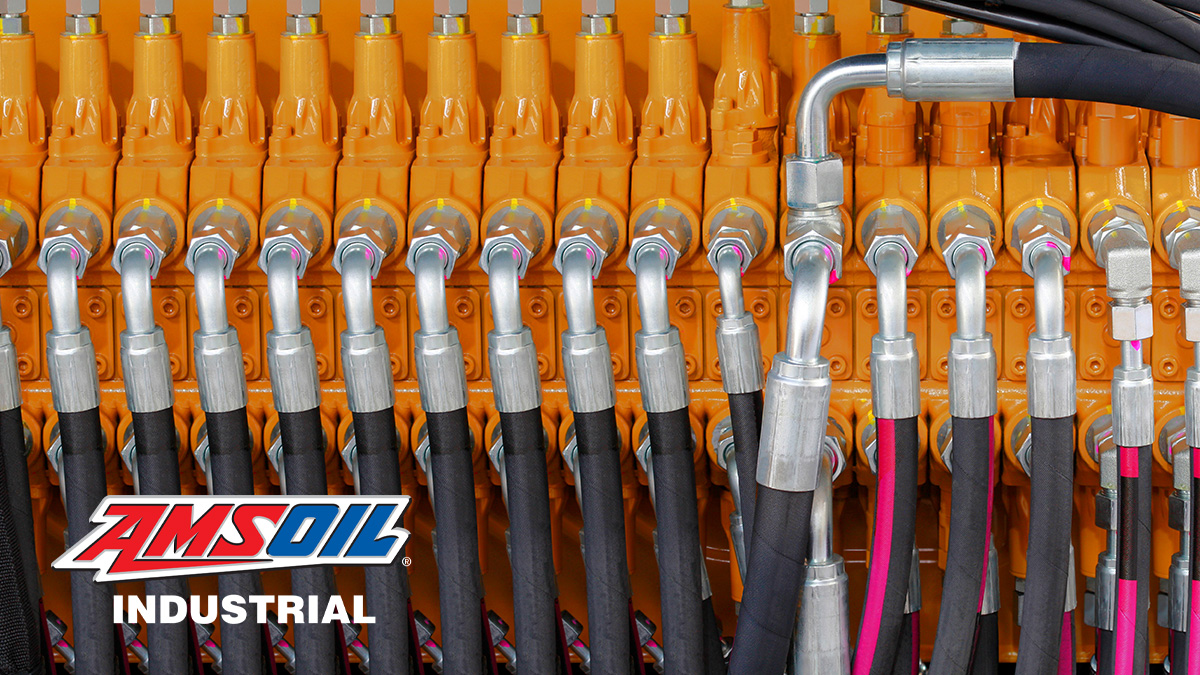Hydraulic components are commonly found in mobile, mining, agricultural and construction equipment, including tractors, bulldozers, excavators and cranes, and in precision manufacturing equipment like metal stamping presses and CNC machines.
Hydraulic applications operating under high load and extreme conditions cause inferior hydraulic oils to deteriorate quickly, leading to a spongy, fading feeling and imprecise control in mobile equipment. In stationary industrial equipment, oxidized oils can also cause sludge and varnish buildup that reduces the performance of your hydraulic equipment and can lead to seal and hose leaks.
Both zinc-containing and zinc-free oils can provide excellent severe-service anti-wear and anti-oxidation properties. However, zinc-containing and zinc-free hydraulic oils are generally incompatible with one another. Incompatible additives can clash or neutralize each other when mixed, reducing the oil’s performance and protection. Oil incompatibility can also accelerate the formation of deposits that block filters and reduce hydraulic performance. Below are some advantages of each type of hydraulic oil and a solution that works for both.
Zinc-Containing Hydraulic Oils
The robust anti-wear properties of zinc dialkyldithiophosphate (ZDDP) additives act as an oxidation inhibitor and form a protective film on metal surfaces to reduce friction and wear in heavy-duty commercial and industrial applications.
Zinc Advantages:
-
Wear Protection: Zinc additives form a sacrificial layer on metal surfaces, minimizing wear and extending component life.
-
Cost: Zinc is often less expensive than alternative anti-wear additives.
Zinc Disadvantages:
-
Environmental: Zinc can be harmful to aquatic life if a leak occurs and reaches waterways.
Zinc-Free Hydraulic Oils
Zinc-free or ashless hydraulic oils use alternative anti-wear and anti-oxidation additives to provide reliable performance and increased compatibility in environmentally sensitive applications, including agricultural equipment, food, pharmaceutical and cosmetic processing and marine applications.
Zinc-Free Advantages:
-
Environmental: Reduces impact on soil and water ecosystems.
-
Compatibility: Improved compatibility with yellow metals.
Zinc-Free Disadvantages:
-
Cost: Specialized additive formulations can increase product costs.
A Better Option
Quality hydraulic oil helps maintain smooth and efficient operation and improve the longevity of agricultural, commercial and industrial equipment. Choosing the right hydraulic oil depends on your specific application, environmental or regulatory factors and budget constraints.
Modern zinc-free hydraulic oil formulas can provide additive compatibility with zinc-based hydraulic oils. AMSOIL Industrial HELIOS-ZF Synthetic Zinc-Free Hydraulic Oil features advanced anti-wear technology that is compatible with installed zinc and non-zinc hydraulic oils for use in a wider variety of applications. Its high compatibility can help with inventory consolidation, easy product changeover and as a convenient top-off oil, even in cases where the existing hydraulic oil type is unknown. It provides excellent wear protection for pumps and motors, while its ashless formulation is safer for the environment.
-
High viscosity index for superior performance in extreme hot and cold temperatures, reducing the need for seasonal change-outs.
-
Superior oxidative stability reduces varnish, sludge and deposits to maintain system performance and cleanliness.
-
High-temperature wear protection for long pump and motor life.
-
Outstanding cold-flow properties for excellent anti-wear protection at startup.
-
Superior compatibility with seals, elastomers and metals, including bronze.
-
Excellent compatibility with most zinc and non-zinc hydraulic oils to simplify changeover and help consolidate inventory.
-
Superior hydrolytic stability and demulsibility for easy water removal and improved filterability.
-
Inhibits air and foam to help control fade and reduce sponginess.
Getting Started
Choosing the right hydraulic oil can help reduce downtime, maintenance and environmental impact, while extending your service intervals and equipment life. Regular oil analysis and maintenance will also help maximize the operational efficiency of your hydraulic systems. Consult an AMSOIL Industrial Application Engineer to identify customized solutions that can improve performance in your specific applications.
